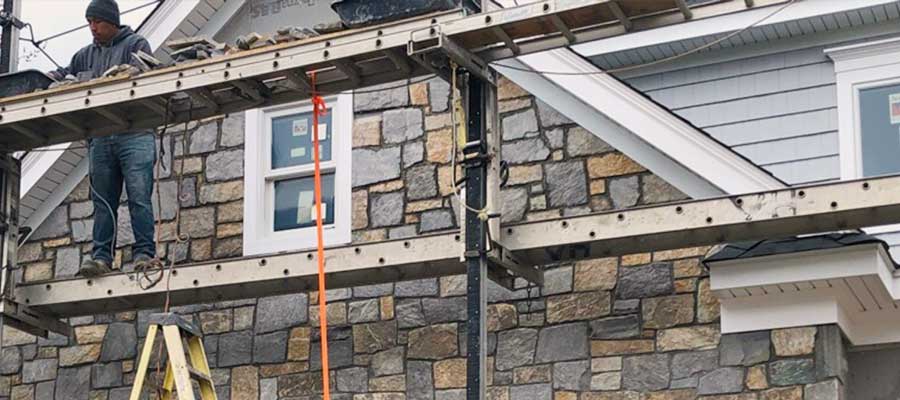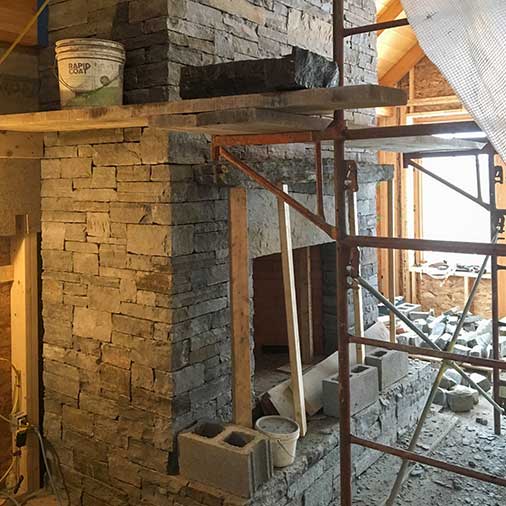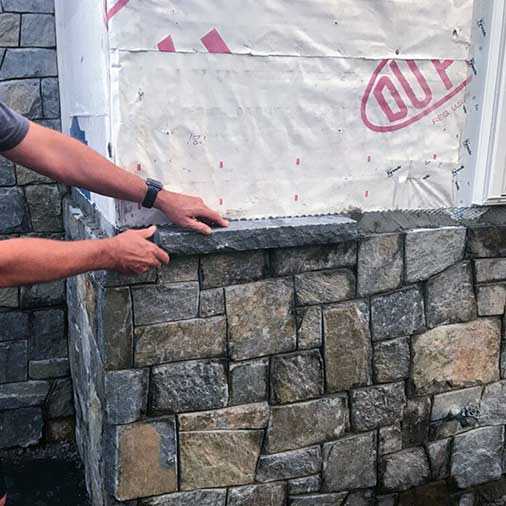The artistry and expertise required in masonry work elevate it beyond mere craftsmanship. Moreover, the investment involved in stonework projects necessitates careful selection. This guide will help you find a skilled professional that offers both expertise and value for your money.
1. Research Your Project & Materials
Before reaching out to potential masons, equip yourself with knowledge about your project and the materials required.
- Investigate Materials: Explore stone options to gauge their variety of attributes, drawbacks, and costs. This preliminary research can help estimate material expenses.
- Understand Your Project: Comprehend the nuances of your project and the specific skills it demands. Whether seeking an artist for an intricate veneer fireplace or a worker for a basic stone wall, align your needs accordingly.
- Seek Local Examples: Identify properties in your vicinity that have undergone masonry work. Engage with homeowners to glean insights into pricing and work quality.
2. Evaluate Ratings & Reviews
Utilize online directories or local recommendations to identify local contractors. Scrutinize their reviews, ratings, and portfolios to assess completed projects.
- Delve Beyond Aesthetics: Pay attention to reviews that not only assess the final output but also delve into aspects like communication, site management, and problem-solving.
3. Compare
Solicit bids from a couple of masons to ensure competitive rates. Some of the best masons are very busy, therefore be mindful of their time spent estimating a job. Keep these considerations in mind:
- Pricing Methods: Some stonemasons may consider uniformity or charge by job or hour. Understand how windows and varying stone sizes affect pricing.
- Clarify Details: Seek transparency in bid components. Inquire about accounting for any special features if charges are per square foot.
4. Get Everything in Writing
Formalize your agreement through a well-structured contract, regardless of project scale. A robust contract safeguards both parties and provides clarity.
- Scope of Work: Detail every aspect, including material supply, workforce involved, cleanup, and a clear timeline with project end date.
- License and Insurance: Verify licensing and insurance compliance as per local regulations. Ensure general liability insurance.
- Payment Terms: Establish a payment schedule that aligns with project milestones. Clearly specify final payment upon project completion.
- Change Management: Define a procedure for project changes, ensuring mutual consent for alterations and avoiding unexpected expenses.
- Timeline Flexibility: Outline how delays and schedule changes will be handled to mitigate conflicts.
Embarking on the journey of finding and hiring a mason demands meticulous planning. By following these steps, you can secure a skilled professional who not only possesses the necessary expertise but also aligns with your project’s vision and your financial considerations.
Questions to ask your potential stonemason
- “Can you show me photos of your previous projects?”
Stonemasons are akin to artists, each possessing a unique style. Ask to view images of completed projects to ensure the stonemason can achieve the specific stone installation style you’re aiming for.
- “How much experience do you have with this type of job?”
Distinguishing between the different types of stone work is crucial. Thin stone veneer demands meticulous attention to individual stones, customizing shapes for a precise fit and selecting stones based on color and grain for a harmonious and consistent final result while patio and wallstone builds demand knowledge of drainage angles, safety, and symmetry.
- “How many years have you worked with stone? What’s your level of experience? Is it 5, 10, or more years?”
- “What kind of warranty do you provide? What type of mortar do you plan to use?”
For thin stone veneer installations, Laticrete MVIS offers a warranty of up to 25 years, encompassing both installation and materials.
- “Why do quotes from different masons vary in price?”
Seek clarity on the discrepancies in process and final outcomes when comparing quotes. Inquire about the specific materials to be used. Proper installation details differentiate between an adequate job and a noteworthy, long-lasting project.
- “What will the worksite conditions be like? How will these factors impact the job site and its surroundings?”
Masonry involves stone cutting, chipping, water usage, noisy power saws with diamond blades, and substantial dust generation.
- “How will you maintain a temperature above 40 degrees?”
Thin stone veneer mortar necessitates a curing temperature exceeding 40 degrees Fahrenheit within the initial 24 hours post-application. This becomes particularly crucial for outdoor winter projects and indoor new constructions during winter.
- “Will you use a water barrier for the job?”
If the project involves thin stone veneer, a water barrier is vital to prevent water infiltration and potential loosening of the stone. All exterior thin stone veneer projects require such a barrier.
- “Do you possess reviews, references, or referrals? I would appreciate insights from your past clients.”
- “What credentials do you hold? Are you trained or certified for thin stone veneer installation? Stonewall building, landscape design, etc?”
When you embark on the journey of hiring a mason, thorough research and clear communication are key. By following this guide, you can ensure a successful partnership that realizes your vision and adheres to your budget.




